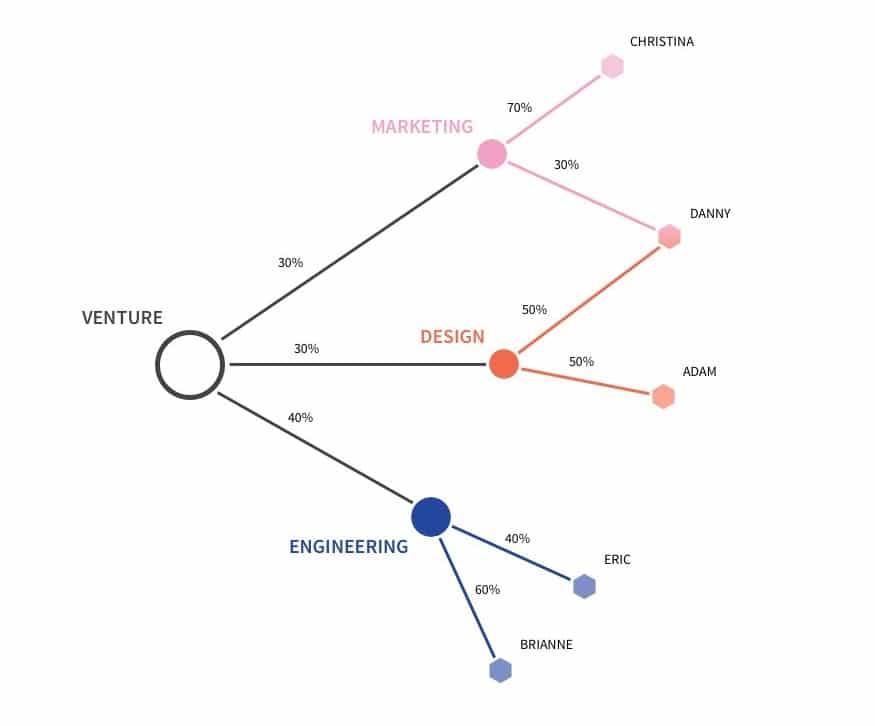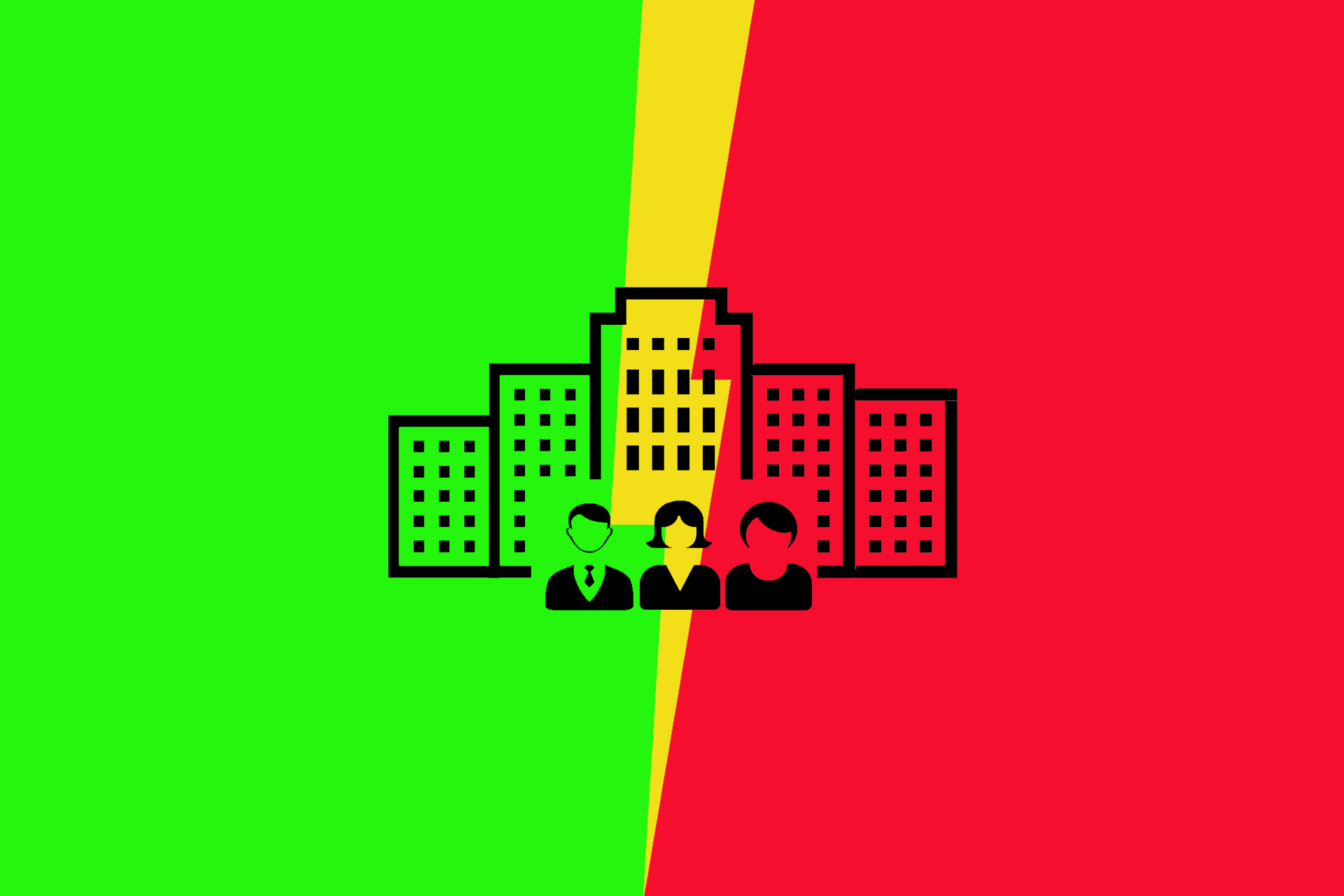Balm for the soul of business
Expand the table of contents
Where decentralised work begins.
When I wrote my exotic diploma thesis, I never imagined that I would one day be a co-founder of a start-up that could revolutionise our working world. But that’s exactly how it happened. Because Justin Carter and Kyle Parkinson have a vision that I enthusiastically share with them: Collaboration without formal pitfalls.
My final thesis at the university was about what management does when the processes control themselves. At the end of the 1990s, that wasn’t an issue. It was simply a pipe dream that went unnoticed. How can complex services such as the construction of a modern research laboratory, a self-propelled car, and transport coordination for the comprehensive range of products offered by a supermarket succeed? It doesn’t matter, but in any case under the umbrella of companies. They control the necessary resources, the machines and the employees. Only this formal superstructure makes our modern life possible. Our venture began about half a year ago. Together we identified 6 valuable lessons about the work of the future.
Trust the system
In autumn 2014 I moderated a knowledge conference at the Gesellschaft für Informatik (GI) in Berlin. A lot of honored IT experts discussed the sovereignty in the net. The average age was well over 40, which was good for the discussion. It was about encryption, decryption, manipulation security etc. A sentence that burned itself into my memory was: “As soon as they connect any device to the net as a single person, they share all information on it with the world. An individual cannot effectively defend against data misuse.”
At the time, Bitcoin and Blockchain were completely unknown to me. My transition from Symbian to Android finally found a moral haven: “It didn’t matter anyway!”
Today there are technologies available that give individuals back their sovereignty over the Net. Projects like Blockstack, are developing an Internet where I decide who has access to my data and how. If I get out, my data stream ends. The blockchain¹ allows for a manipulation-free documentation of the processes, if their course is backed up decentrally in multiple ways. For a fraud to occur, thousands of data records, stored independently of each other worldwide, would have to be changed simultaneously and in the same way. If this does not succeed, I reliably see my agreements. Both are crucial for a credible cooperation without a corporate superstructure. Our project is called Misthos. With it we document collaboration and financial flows in a trustworthy manner in this environment. As a result, you don’t need an accountant or a bank to see if and that you are being paid correctly.
Being able to want counts
Three people are involved in Misthos. For the past few months two have been working practically full-time. As befits a start-up, the previous commitment took place without income. We put time, know-how and network into this entrepreneurial venture. Of course, this is only possible for a limited period of time. That is why we are currently looking for investors. We presented Misthos for this at an international event in Berlin.
Since then we have been holding talks with business angels. So far so good, one might think. In fact we are founding a corporation. We work out contracts. We check agreements. Or in other words, we manage the future potential property value of the company. All this stops us from doing what we want to do – bringing Misthos into the world. Funnily enough, Misthos would be the solution for just that. Step by step, it documents the influences that turn a start-up from a venture into economic success. In this way, one can do without complicated property distribution agreements. The participants know their share of the future profits. In other words, no more interruptions in development for time-consuming contract negotiations. The time to failure or successful implementation on the market is thus shortened considerably.
Valuing replaces measuring and punishing
This week I sat in a fireside chat as a listener. The title: “Brave New Work”. We talked to Hermann Arnold, the founder of umantis². Today his company is part of HAUFE umantis and one of the showcase examples for new forms of cooperation. In the course of the event, a man from the audience came to a statement which received broad mumbled approval: “What we definitely need is the appreciation of the employees. Without them, all this New Work talk backfires!”

The estimation of value and benefit contributions
The statement reminded me of an investor meeting we had the day before. The prospective buyer asked us, “Then how do you measure in your graph who’s doing how much?” After a brief pause for silence, we replied, “No, no. We do not measure anything. The distribution arises as a negotiation in a social process outside the software. Our program shows who is to be involved in the decision in the venture. Then people appreciate their value and contribution. The result of this value estimation is then documented bindingly in Misthos by everyone. If we measure anything at all, it is the receipt of money and the correct distribution according to the documented agreement.” Only in the fireside chat did I recognise the depth of this social paradigm shift. Instead of wanting to measure and regularly downgrading the value of the employees’ contribution before payment, Misthos teaches us to appreciate each other. Afterwards we reward each other with the fruits of cooperation.
It is humane
Practically everyone understands the Misthos graph from left to right. So how much money is distributed to whom. But since nothing arrives there at the moment, we, the developers, read it from right to left. Who contributes what to the success. We have to discuss this if we want to be part of the income stream that will hopefully start at some point. That alone improves communication.
Of course we are uncertain. Again and again we doubt the possible success. We have doubts about how our venture will develop. Instead of keeping it under wraps, we talk about it. Anything else visibly endangers the desired results. Visibly, because Misthos shows us what happens if one of us suspends his contribution. He slows down the project. This openness does not lead to bullying, on the contrary, I experience more respect and understanding than I see in many companies I am allowed to look into. If you always keep the expectations of the group in mind, you grow with it.
Scales revolutionise work
For more than a decade I have been cooperating in consulting projects according to the basic principles, which also take Misthos into account:
- Instead of talking about money, we talk about value and performance shares. Kathleen Voh’s studies³ show that it is enough to mention money to limit our willingness to cooperate.
- Determining the distribution is a social process, not a technical measuring process. By agreeing to it, we avoid measuring human performance. Instead, it recognises their contribution.
- The agreement is binding. Changing it requires the consent of all parties concerned.
In this way, it is possible to reach a meaningful agreement before the first money arrives. If there are revenues, they simply flow through distribution. All discussions about shares, contributions etc. are then already concluded. Money disappears from perception. It simply takes place. In its place, the focus is on the success of the project. I have been living this successfully for several years for cooperations with a maximum of five partners. A larger group needs a tool like Misthos.
Technology allows us to scale humanly healthy collaboration. This allows us to break down corporate boundaries. Where does that lead? In any case into completely new working worlds.
These six insights lead to a different picture of people at work. In it, we earn our income from participating in freely chosen economic ventures. Negotiations with superiors and companies are replaced by agreements on performance and value contributions. Collaboration can develop quickly. It grows without obstacles. Even a separation is unproblematic. In this picture, energy flows together where it is needed and wanted. We thus put ourselves in a position to work meaningfully to an extent never seen before.
Notes:
[1] Information about Blockchain at Wikipedia
[2] Information about Hermann Arnold at HAUFE umantis (in German)
[3] Kathleen Vohs – The Psychological Consequences of Money
Gebhard Borck has published more posts in the t2informatik Blog:

Gebhard Borck
Gebhard Borck set out two decades ago to find a fair business management. On his way he discovered that it was probably still to be developed. Since then he has dedicated his work to this task. Together with changing customers and daring colleagues, the company catalysis developed from this. A practicable alternative to the existing business administration. The most exciting thing is: with it your company will run in many contexts, be it in lived capitalism, in de-growth or in a circular economy, like on the donut. One thing is the same in all variations: the focus on existential balance as the central measure of success. In his current book “Die selbstwirksame Organisation” (The Self-Effective organisation), the transformation catalyst describes how you can successfully play the operating catalysis in your company.
In the t2informatik Blog, we publish articles for people in organisations. For these people, we develop and modernise software. Pragmatic. ✔️ Personal. ✔️ Professional. ✔️ Click here to find out more.


